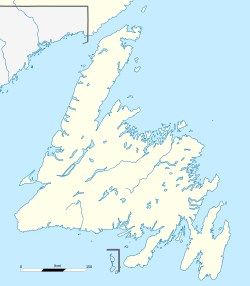Pasadena, Newfoundland and Labrador
|
Pasadena Crown of the Valley |
||
|---|---|---|
| Town | ||

Pasadena Air Photo (2001)
|
||
|
||
| Motto: Crown of the Valley | ||
| Location of Pasadena in Newfoundland | ||
| Coordinates: 49°00′58″N 57°36′18″W / 49.01611°N 57.60500°WCoordinates: 49°00′58″N 57°36′18″W / 49.01611°N 57.60500°W | ||
| Country |
|
|
| Province |
|
|
| Settled | Early 1920s | |
| Incorporated | 1969 | |
| Government | ||
| • Type | Pasadena Town Council | |
| • Mayor | Otto Goulding | |
| • CAO | Brian Hudson | |
| • MHA | Scott Reid (L) | |
| • MP | Gudie Hutchings (L) | |
| Area | ||
| • Total | 49.6 km2 (19.2 sq mi) | |
| Elevation | 30 m (100 ft) | |
| Population (2011) | ||
| • Total | 3,352 | |
| • Density | 68.2/km2 (177/sq mi) | |
| Time zone | Newfoundland Time (UTC– 3:30) | |
| • Summer (DST) | Newfoundland Daylight (UTC– 2:30) | |
| Postal code span | A0L | |
| Area code(s) | 709 | |
| Highways | Route 1 | |
| Website | Town of Pasadena | |
Pasadena is an incorporated town located in census division 5 which is in the western portion of Newfoundland, Canada and it is a picturesque community on the shores of Deer Lake at the junction of the North Arm Valley and the Humber Valley.
The town was named after Pasadena, California. The meaning of the name is sometimes claimed to be "crown of the valley". The Town of Pasadena claims the name is Spanish for "crown of the valley". However, the name, first applied to the city in California, is a corruption of an Ojibwe phrase meaning "valley" or "of the valley". The founders of Pasadena, California, claimed it was Ojibwe for "crown of the valley" or "key of the valley" when in fact it only meant, roughly "of the valley".
The Town of Pasadena formerly consisted of three separate communities: South Brook, Pasadena and Midland.
South Brook was located on the sandy shore of Deer Lake. It evolved much earlier than Pasadena, starting out in the early 1920s as a logging camp for the Bowater Company from Corner Brook. The railway also used South Brook, but only as a stop along its route across the island. In 1921, the census showed that South Brook only had a population of 6 people, within 2 families.
However, South Brook soon became a hive of activity, when the Bowaters Company started up its woods operations. It established a bunkhouse, cook-house and a company store to supply the needs of the areas wood camps. These camps would employ as many as 100 loggers during the winter months. Logging was the main industry in South Brook, but it also had a good supply of rock, which was suitable for the building of the power house in Deer Lake, so a quarry was set up and the rock was shipped to Deer Lake by train.
Homes began to spring up in South Brook as the men coming to work in the wood camps brought their families with them. With women and children living there, schools, medical aid, and recreation facilities were needed. church services were held in people’s houses at first, but later, all religions used the school as their church.
...
Wikipedia


